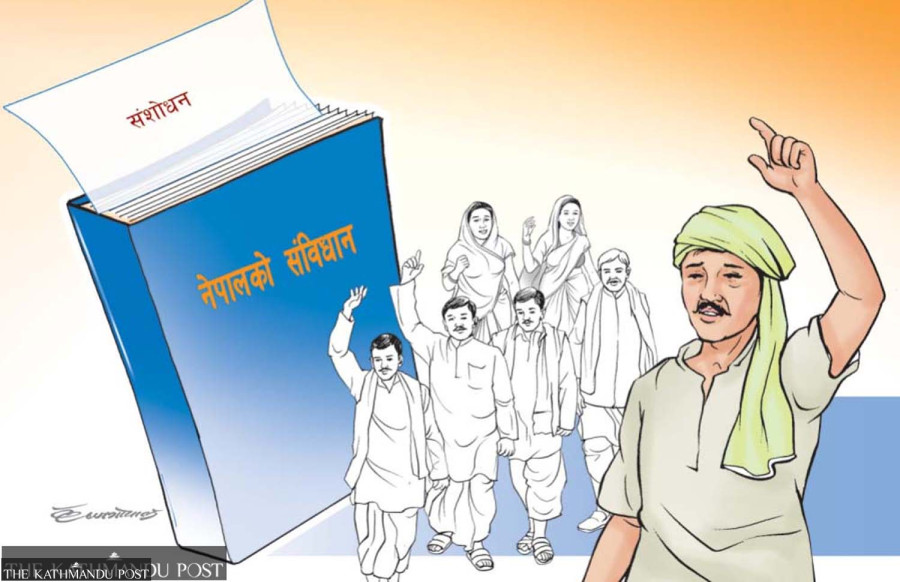Politics
First meet of Madhesh forces for unity to counter ruling parties’ plans falters
Absence of some parties in inaugural sitting suggests an alliance won’t be easy to build.
Purushottam Poudel
The Madhesh-based political parties considering a ‘loose alliance’ held their first meeting on Tuesday.
In a rather discouraging sign for the parties seeking such an alliance, some forces, including the Janata Samajbadi Party-Nepal (JSP-Nepal), and the Nagarik Unmukti Party, chose to stay away from the meeting. Attending leaders, however, said they were determined to give momentum to the initiative.
Raj Kishor Yadav and Ram Kumar Sharma of the JSP-Nepal were supposed to represent their party in the meeting but Yadav went to India the same day and Sharma did not show up.
The leaders involved in the initiative said the JSP-Nepal is positive about the alliance and will attend the next meeting, which will soon be convened.
Keshav Jha, a representative of Rastriya Mukti Party who represented the Rajendra Mahato-led group in the Tuesday meeting, said that JSP-N leaders would participate in the next meeting.
Upendra Yadav, the party chair, had also gone to Uttar Pradesh, India, according to a party leader. There, the JSP-Nepal leaders met Samajbadi Party leader Akhilesh Yadav.
Ranjita Shrestha, chairperson of the Nagarik Unmukti Party, said that her party was absent as they were unaware of the event.
“We did not have prior information about it,” Shrestha said. “If such meetings’ agenda don’t contradict our party’s policies, we can consider joining the next meeting.”
Some leaders involved in the process claimed that they have been discussing the matter with Resham Chaudhary, the patron of the Nagarik Unmukti Party, and he is positive about it.
The two largest parties—the Nepali Congress and the CPN-UML—which are also ruling partners, have of late blamed the proportional representation (PR) electoral system for the presence of a large number of political parties in the federal and provincial legislatures. This, they say, creates political instability.
They are considering amending the PR system in electoral laws with a view to reducing the number of fringe parties to end their “unnatural bargaining for power”. The ruling coalition’s plans to change the election laws to raise the PR threshold are in turn forcing the regional parties to collaborate.
Currently, the threshold of proportional votes is 3 percent in the House of Representatives and 1.5 percent in provincial assemblies. However, Congress and UML leaders have publicly advocated amending the election law to raise the bar to 5 percent and 3 percent in the House and provincial assemblies, respectively.
During the gathering of Madhesi leaders on Tuesday, Hridayesh Tripathi, the chairman of a new outfit Janata Pragatisheel Party, said Madhesh-centric parties are being portrayed as forces that cannot work together. He insisted on the need for a working alliance between the Madheshi parties.
“To stand firmly against the two big parties’ domination in national politics, it is high time that Madhesh-based parties work together,” Tripathi told the Post, citing his proposal at the meeting. “Collaboration between Madhesh-centric parties is also necessary to safeguard the achievements of the Madheshi movement.”
Tripathi stressed that a loose network of Madheshi forces “is needed to defend our interests at this crucial juncture”.
According to him, leaders attending the introductory meeting decided to discuss the prospects of an alliance within their parties and come up with their proposals in the next meeting.
Independent lawmaker from Madhesh Amaresh Kumar Singh argued that “a network shouldn’t be formed to strengthen certain leaders’ bargaining power” but to support the cause of the Madheshi people.
“Should the Madheshi front work for the interest of the marginalised people, I’ll always be in favour of such an alliance,” Keshav Jha quoted Singh as telling the meeting.
Jha urged other leaders to reflect on the earlier alliances and the reasons they couldn't work, before attempting something similar this time around.
Several Tarai-based political parties are represented in the federal parliament: the Ashok Rai-led Janata Samajbadi Party (7 seats), the CK Raut-led Janamat Party (6 seats), the Upendra Yadav-led JSP-Nepal (5 seats), the Mahanta Thakur-led Loktantrik Samajbadi Party (4 seats), the Ranjita Shrestha-led Nagarik Unmukti Party (4 seats), and the Prabhu Sah-led Aam Janata Party (1 seat). Independent lawmaker Singh represents a Sarlahi constituency in the same region.
If the Madheshi parties form an alliance, they will together command 28 seats in the federal parliament.
A leader from Madhesh claimed that if they stand together, they could have a strong say not only in making and breaking governments but also in selecting political appointees for constitutional bodies and to fill other state positions.
However, Keshav Jha of the Rastriya Mukti Party denies this claim. “We work collaboratively in various forums to raise Madhesh’s voice. This alliance in the making has nothing to do with an exercise of power,” Jha claimed.




 18.12°C Kathmandu
18.12°C Kathmandu















